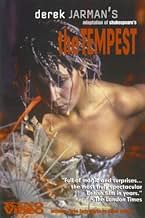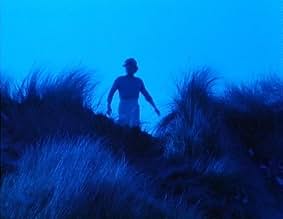IMDb-BEWERTUNG
6,3/10
1336
IHRE BEWERTUNG
Füge eine Handlung in deiner Sprache hinzuBanished to a forsaken island, the Right Duke of Milan and Sorcerer Prospero gets the chance to take his revenge on the King of Naples with the assistance of his airy spirit-servant, Ariel.Banished to a forsaken island, the Right Duke of Milan and Sorcerer Prospero gets the chance to take his revenge on the King of Naples with the assistance of his airy spirit-servant, Ariel.Banished to a forsaken island, the Right Duke of Milan and Sorcerer Prospero gets the chance to take his revenge on the King of Naples with the assistance of his airy spirit-servant, Ariel.
- Regie
- Drehbuch
- Hauptbesetzung
Empfohlene Bewertungen
This movie sucked. I was studying "the tempest' at school recently, and this being the most faithful adaption my teacher could find, we watched it.
Prospero looked more like an incarnation of Doctor Who, Miranda was some kind of seventies punk-brat (no change there, then, for toyah wilcox) and derek jarman clearly held the misguided notion that showing the fullfrontal scene of ferdinand clambering ashore in the buff would be enough to save this crap from descending into seat squirmingly, buttock clenchingly arduous cinema.
however, unsurprisingly, scenes added more for the titillation of the director than for the enrichment of the production will not (shock horror) help this utter trite.
Prospero looked more like an incarnation of Doctor Who, Miranda was some kind of seventies punk-brat (no change there, then, for toyah wilcox) and derek jarman clearly held the misguided notion that showing the fullfrontal scene of ferdinand clambering ashore in the buff would be enough to save this crap from descending into seat squirmingly, buttock clenchingly arduous cinema.
however, unsurprisingly, scenes added more for the titillation of the director than for the enrichment of the production will not (shock horror) help this utter trite.
I thought this was very "different" compared to most modern interpretations of Shakespeare and enjoyed it thoroughly. It would not be useful for those studying it at school etc. as it does not show the traditional Shakespeare character interpretations (i.e- Miranda is portrayed quite punky compared to your traditional Shakespeare lady) but for understanding of the play and for the basis of the story it is a very strong piece and fantastic to watch. It does not include also the correct format, as in the layout of acts and scenes as I am currently playing Miranda in a production and most of her lines had been cut and some scenes split and mixed around but it is very useful and I would definitely recommend it as a must-see even if just to say you've seen it! Shakespeare fans would love this!
"Speak the speech, I pray you, as I pronounc'd it to you, trippingly on the tongue; but if you mouth it, as many of our players do, I had as lief the town-crier spoke my lines."
Those are the directions that Hamlet gives the players on how to perform the Mousetrap. While the rhythms of Elizabethan English are difficult for Americans, they seems to come naturally for British actors, and those here perform it well enough.
The problems with this production arise, as they often do for THE TEMPEST, from the director's efforts to make it visually striking. Because of the magic that lies at the heart of Shakespeare's autumnal work, its gorgeous language has fallen prey to people who think the best way to stage it is to think what Quentin Crisp would sneer at as too camp and turn it up a couple of notches. One Shakespeare in the Park staging required a dozen people to play Ariel, including a Sumo wrestler; and Peter Greenaway's gloss on the play, PROSPERO'S BOOK, is so bad that when I saw it with some friends, I disrupted the occasion by guffawing at the over-the-top images. They show up here, too.
What all these geniuses fail to realize is that the play is a boy-meets-girl story, something Shakespeare wrote several dozen times. At its core is a coming-of-age story for Miranda, an adolescent girl who is old enough to leave her father. She is confronted by various male archetypes before settling on the only boy her own age. The Bard of Avon's message is so normal, that like should marry like, that youth calls to youth and that Show Business is the process of taking these ordinary and important stories and making us pay for them by wrapping them in mystery ... well, so normal that people miss the point.
The play's real magic is the story of Rapunzel and Snow White and all the other fairy tales which Bruno Bettelheim has shredded to show their symbolic content. That and the language. These should be enough for anyone like me, who cares for these things. It's too bad that the people who produced this version either don't care about Shakespeare or think that no normal person will.
Those are the directions that Hamlet gives the players on how to perform the Mousetrap. While the rhythms of Elizabethan English are difficult for Americans, they seems to come naturally for British actors, and those here perform it well enough.
The problems with this production arise, as they often do for THE TEMPEST, from the director's efforts to make it visually striking. Because of the magic that lies at the heart of Shakespeare's autumnal work, its gorgeous language has fallen prey to people who think the best way to stage it is to think what Quentin Crisp would sneer at as too camp and turn it up a couple of notches. One Shakespeare in the Park staging required a dozen people to play Ariel, including a Sumo wrestler; and Peter Greenaway's gloss on the play, PROSPERO'S BOOK, is so bad that when I saw it with some friends, I disrupted the occasion by guffawing at the over-the-top images. They show up here, too.
What all these geniuses fail to realize is that the play is a boy-meets-girl story, something Shakespeare wrote several dozen times. At its core is a coming-of-age story for Miranda, an adolescent girl who is old enough to leave her father. She is confronted by various male archetypes before settling on the only boy her own age. The Bard of Avon's message is so normal, that like should marry like, that youth calls to youth and that Show Business is the process of taking these ordinary and important stories and making us pay for them by wrapping them in mystery ... well, so normal that people miss the point.
The play's real magic is the story of Rapunzel and Snow White and all the other fairy tales which Bruno Bettelheim has shredded to show their symbolic content. That and the language. These should be enough for anyone like me, who cares for these things. It's too bad that the people who produced this version either don't care about Shakespeare or think that no normal person will.
I'm amazed that of all the reviews I've looked at nobody seems to have noticed one of the main points of this film, or at least how I saw it. It seems like one big homosexual fantasy, camp clothing, a glorified nude Ferdinand, a definite sexual tension between Ariel and Prospero, and as a final climax, a group of men in tight sailor suits dancing the hornpipe. This whole approach, once you get used to it, provides you with all sorts of fantastic scenes and images. The sight of an innocent Ariel being pulled towards a disgusting nude Sycorax in order to perform "her earthy and abhorr'd commands", is one of the darkest I've ever scene in a Shakespeare film. However by the end of the film I'd grown tired of the style and the final hornpipe dance was just too much to take. Still overall its an interesting interpretation of the play.
Derek Jarman has shown us time and time again that dialog is not his strong suit. He is a painter, and paint he does. His films are almost always visually splendid, but about as exciting to watch as paint that is already dry. Watch his movies in fast forward, the really fast setting that you can only get on DVD. In The Tempest, Jarman does very little with the script or the characters, using them as simply a lattice to hang a very long and well-constructed cinematographic frame. He even goes so far as to contradict Shakespeare's original script to achieve these excrucriatingly slow and lifeless scenes. There is none of the romance, magic, trickery, or urgency the script calls for, little spontaneity, and the character of Caliban in particular is reduced to a quivering and insane idiot of sorts, similar to Gaveston in Jarman's Edward II. It is too bad that this is just about the only film version of The Tempest available.
Wusstest du schon
- WissenswertesThe role of Prospero was originally intended for an older actor and John Gielgud was approached but declined. It was then offered to Terry-Thomas but his failing health caused him to turn it down. The character was then rewritten as a younger Prospero and Heathcote Williams was cast.
- Zitate
Miranda, his daughter: Oh, how beauteous mankind is. O brave new world that has such people in it!
- Crazy CreditsMany Thanks To All Those Who Took An Interest and Especially... and All The Sailors Who Weathered The Storm.
- VerbindungenFeatured in Toyah (1980)
- SoundtracksStormy Weather
Written by Harold Arlen & Ted Koehler
Performed by Stephen Pruslin (as Steven Pruslin) and Dave Campbell
Sung by Elisabeth Welch
Arranged by Stephen Pruslin (as Steven Pruslin)
Produced by Guy Ford
Top-Auswahl
Melde dich zum Bewerten an und greife auf die Watchlist für personalisierte Empfehlungen zu.
- How long is The Tempest?Powered by Alexa
Details
- Erscheinungsdatum
- Herkunftsland
- Offizieller Standort
- Sprache
- Auch bekannt als
- The Tempest
- Drehorte
- Produktionsfirma
- Weitere beteiligte Unternehmen bei IMDbPro anzeigen
Box Office
- Budget
- 150.000 £ (geschätzt)
- Weltweiter Bruttoertrag
- 813 $
- Laufzeit1 Stunde 35 Minuten
- Sound-Mix
- Seitenverhältnis
- 1.37 : 1
Zu dieser Seite beitragen
Bearbeitung vorschlagen oder fehlenden Inhalt hinzufügen

Oberste Lücke
By what name was Der Sturm - The Tempest (1979) officially released in Canada in English?
Antwort

























